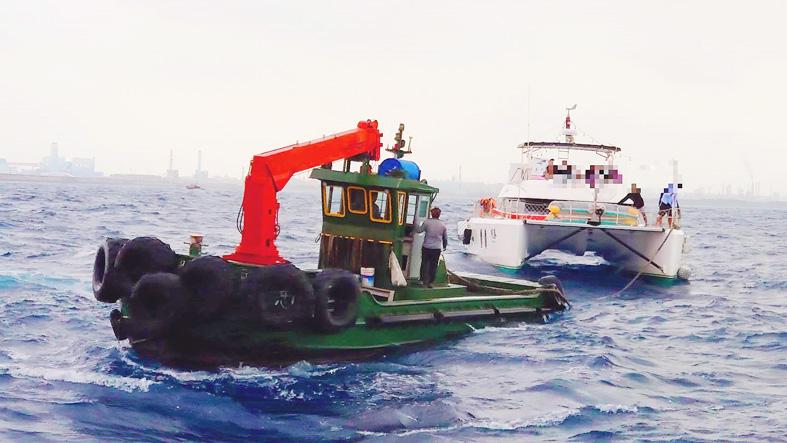A cruise ship lost power 2.5 nautical miles (4.6km) southwest of the Port of Kaohsiung on Monday afternoon.
There were 23 passengers on board the Chun (春) when it lost power.
The Kaohsiung Fleet Branch of the Coast Guard Administration (CGA) rushed to the scene after receiving a report of the incident at 4:30pm while it was carrying out a regular patrol in the area.

Photo courtesy of the Coast Guard Administration
The fleet immediately reported to the 13th Patrol Command, which established an emergency response center and sent a vessel to rescue the ship.
The vessel met up with the Chun at 4:45pm and it learned that the captain, surnamed Kuo (郭), had contacted another boat, the Chung (忠), to come and provide assistance.
Members of the fleet calmed the passengers and the Chung arrived at about 6pm and towed the Chun to the harbor while being escorted by the patrol vessel.
The ship and the passengers safely arrived at 22nd dock at the Port of Kaohsiung at 7:50pm.
A preliminary investigation suggested that the boat accidentally used up its fuel because its fuel gauge was not working, the CGA said.
The fleet urged owners to properly maintain their ships, thoroughly check them before setting off and to pay attention to the weather forecast.
If an emergency occurs at sea, the CGA can be reached by telephone at 118.

Taiwan is to commence mass production of the Tien Kung (天弓, “Sky Bow”) III, IV and V missiles by the second quarter of this year if the legislature approves the government’s NT$1.25 trillion (US$39.78 billion) special defense budget, an official said yesterday. Commenting on condition of anonymity, a defense official with knowledge of the matter said that the advanced systems are expected to provide crucial capabilities against ballistic and cruise missiles for the proposed “T-Dome,” an advanced, multi-layered air defense network. The Tien Kung III is an air defense missile with a maximum interception altitude of 35km. The Tien Kung IV and V

The disruption of 941 flights in and out of Taiwan due to China’s large-scale military exercises was no accident, but rather the result of a “quasi-blockade” used to simulate creating the air and sea routes needed for an amphibious landing, a military expert said. The disruptions occurred on Tuesday and lasted about 10 hours as China conducted live-fire drills in the Taiwan Strait. The Civil Aviation Administration (CAA) said the exercises affected 857 international flights and 84 domestic flights, affecting more than 100,000 travelers. Su Tzu-yun (蘇紫雲), a research fellow at the government-sponsored Institute for National Defense and Security Research, said the air

A strong continental cold air mass is to bring pollutants to Taiwan from tomorrow, the Ministry of Environment said today, as it issued an “orange” air quality alert for most of the country. All of Taiwan except for Hualien and Taitung counties is to be under an “orange” air quality alert tomorrow, indicating air quality that is unhealthy for sensitive groups. In China, areas from Shandong to Shanghai have been enveloped in haze since Saturday, the ministry said in a news release. Yesterday, hourly concentrations of PM2.5 in these areas ranged from 65 to 160 micrograms per cubic meter (mg/m³), and pollutants were

Taiwan lacks effective and cost-efficient armaments to intercept rockets, making the planned “T-Dome” interception system necessary, two experts said on Tuesday. The concerns were raised after China’s military fired two waves of rockets during live-fire drills around Taiwan on Tuesday, part of two-day exercises code-named “Justice Mission 2025.” The first wave involved 17 rockets launched at 9am from Pingtan in China’s Fujian Province, according to Lieutenant General Hsieh Jih-sheng (謝日升) of the Office of the Deputy Chief of the General Staff for Intelligence at the Ministry of National Defense. Those rockets landed 70 nautical miles (129.6km) northeast of Keelung without flying over Taiwan,